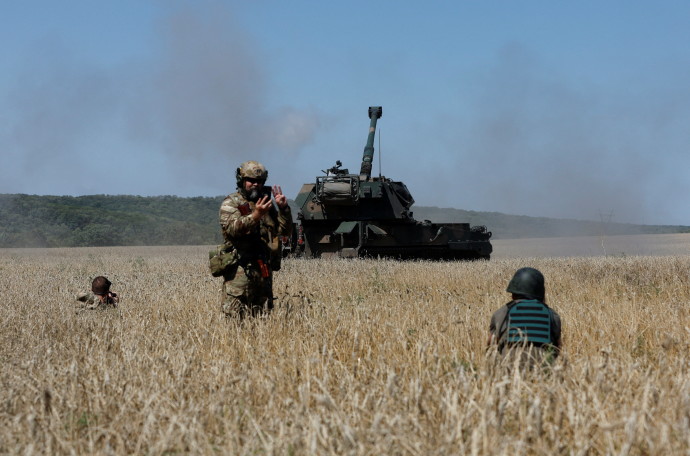While Russia has been scrambling to reinforce forces severely lacking in manpower across the Ukrainian front with newly enlisted conscripts, Russian military capabilities are still incredibly below par, according to an intelligence report by the UK Ministry of Defense.
A US intelligence report also claims that the Russian military is suffering manpower shortages as it battles Ukraine and is seeking to recruit contract service members, and may even draw in convicted criminals, to fill the gaps created amid ground forces, a US official said on Wednesday.
In the last six weeks, there has been a clear move from Russian ground forces to transition to a long-term, defensive posture on most areas of the front line in Ukraine, likely due to a more realistic assessment that the severely undermanned, poorly trained forces on the battlefield are currently only capable of defensive operations, the UK report said.
Reports from Russian officers in September indicated that companies in the Kherson region, which has been the target of a massive counteroffensive by Ukraine in the last month, consist of "only six to eight men each." A standard company typically deploys with around 100 personnel.
Russia’s forces in Ukraine could be undermanned by around 15% to 20%, Dara Massicot, a senior policy researcher at the Rand Corp. think tank which specializes in Russian military strategy, told the Wall Street Journal based on Russian documents recovered following the defeat of one Russian unit, the 136th motorized rifle brigade, inside Ukraine that reflected such a shortfall.
“This unit was considered a typical unit so it may be that the [overall] shortages are similar on average,” she said.

Ukrainian forces rapidly advance in the Kherson region
Ukrainian forces achieved their biggest breakthrough in the region since the war started, advancing rapidly along the Dnipro River toward Kherson, a key provincial capital held by Russia.
Ukraine's goal is to push Russian troops to the east bank of the Dnipro in the Kherson region. And for Russia, this will be a significant defeat, according to Assistant Secretary of Defense of the US International Security, Celeste Wallander.
Ukrainian success in Kherson would lay the foundations for a “broader” counteroffensive in the spring, boosting morale and control in the south while reassuring allies of the Ukrainian army’s capabilities.
"It further distances Russia's desire to capture Odesa, which it stated as a goal in the theater. And this provides Ukraine with a better defensive position to reduce the intensity of fierce battles during the coming winter," Assistant Secretary of Defense of the US International Security, Celeste Wallander said.
Fighting poorly on two fronts
Russia is effectively fighting on two separate fronts, seeking to advance in Ukraine’s east and south, despite this Putin has promised a fresh offensive, saying last month that “by and large, we have not started anything serious yet.”
However, Russia is stalled on both fronts and has made no significant territorial gains in more than six weeks, one reason is a lack of personnel, according to military analysts.
“They don’t really have a good manpower solution for what they’re trying to do at the moment,” Massicot told the Wall Street Journal. “I don’t see them having a capable force for a major offensive. What they could do right now is muddle through and make small incremental gains, but it’s not going to be a powerful push.”
“I don’t see them having a capable force for a major offensive. What they could do right now is muddle through and make small incremental gains, but it’s not going to be a powerful push.”
Dara Massicot
Colin Kahl, the US Defense Department undersecretary for policy, told reporters earlier in August that the US estimates Russia took heavy casualties in the first months of the war.
The tally of dead and wounded is as high as 80,000, according to Kahl and an estimate by the Pentagon. Russia, however, said in March that only 1,351 troops had died in Ukraine since the start of the conflict. the figure has not been updated officially since.
“There’s a lot of fog in war, but I think it’s safe to suggest that the Russians have probably taken 70 or 80,000 casualties in less than six months,” Kahl said. “Now, that is a combination of killed in action and wounded in action and that number might be a little lower, a little higher, but I think that’s kind of in the ballpark.”
Russia announces end of partial mobilization
On Friday, Russian Defense Minister Sergei Shoigu announced that the partial mobilization plan, aiming to enlist 300,000 conscripts to fight in Ukraine, has been officially completed, with more than a quarter of them already present on the battlefield.
"The task set by you of (mobilizing) 300,000 people has been completed. No further measures are planned," Defense Minister Sergei Shoigu told President Vladimir Putin at a televised meeting in the Kremlin.
Both men acknowledged "problems" in the early days of the call-up. Shoigu said initial issues in supplying newly mobilized troops had since been resolved. Putin said mistakes had probably been inevitable as Russia had not carried out mobilization for such a long time, but that lessons had been learned.
